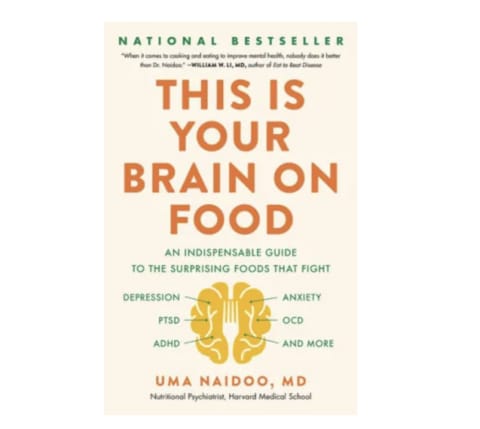Advertisement
5 Foods That Trigger Anxiety, From A Nutritional Psychiatrist


While stress is a normal and healthy reaction to challenges throughout life (we call this good stress eustress), it can become dangerous when it's chronic or excessive.
Regularly having extreme feelings of fear or worry can lead you to avoid certain situations or start unhealthy habits. This is considered anxiety, and it warrants attention.
While stress is a normal and healthy reaction to challenges throughout life (we call this good stress eustress), it can become dangerous when it's chronic or excessive.
Regularly having extreme feelings of fear or worry can lead you to avoid certain situations or start unhealthy habits. This is considered anxiety, and it warrants attention.
My field of nutritional psychiatry addresses the symptoms of anxiety through evidence-based food choices. It operates on the idea that the foods we eat play a key role in reducing or exacerbating anxiety via the gut-brain connection.
The gut-brain connection highlights the interconnectivity of these two organs, indicating that the gut and the brain are in constant two-way communication and the health of one directly influences the health of the other. Our gut microbes, specifically, are a key determinant of anxiety symptoms. When inflammation is present in the gut, it can lead to inflammation in the brain called neuroinflammation. Evidence tells us that neuroinflammation is increased in those with anxiety1, so those looking to reduce symptoms of stress should avoid anxiety-inducing foods.
After years of working in nutritional psychiatry, these are types of foods I recommend avoiding to reduce symptoms of anxiety:
Processed foods
Packaged foods that we find on grocery store shelves with lengthy ingredient lists and expiration dates are typically packed with processed additives like sugar and omega-6 fatty acids. When consumed in excess, these ingredients feed the bad microbes in the gut and worsen inflammation2 (and, therefore, stress) over time. These foods are also devoid of brain-boosting vitamins, minerals, and fiber.
I always recommend that individuals shop the perimeter of the grocery store and reach for nutrient-dense whole foods like fresh or frozen vegetables and clean proteins first. Then, browse the center aisles for budget-friendly dried beans, lentils, legumes, canned wild salmon, oysters, or mussels, organic beans, and chickpeas.
Added & refined sugars
Did you know that there are about 262 other names for the sneaky sugars found in food items today? While you expect these to be found in cakes, pastries and baked goods, boxed cereals, and granola bars, you don't think of the sugar in ketchup, salad dressings, or pasta sauces. Sugars can even be found in more savory items like takeout french fries.
The hyper-palatability of these foods may initially please taste buds, but excess sugar ultimately wreaks havoc on gut health, exacerbates inflammation, increases anxiety3, and worsens mood4.
Because sugar is a substance that has an addictive effect, the less we eat over time, the less of it we will crave. However, for those really looking for a sweet, I recommend reaching for a handful of blueberries or a square of extra-dark natural chocolate.
Industrial oils
The industrialization of the food industry has led to the development of highly processed, inexpensive oils. These oils are typically created from the byproduct of the system's most abundantly grown crops (such as corn, grapeseed, soybean, sunflower, and palm fruit).
Through processing, these oils become high in omega-6 fatty acids and devoid of omega-3s. Excess omega-6 fatty acids in the diet contribute to an excess of inflammatory molecules5 throughout the body, especially in the gut and brain.
Avoid these oils by reducing your intake of packaged foods and fast foods. For home cooking, choose healthier alternatives like extra-virgin olive oil and avocado oil.
Alcohol
While alcohol can worsen anxiety, it does not have the same effect on everyone. General guidance here is that if you do consume alcohol, do so in moderation and use your body intelligence to pay attention to how alcohol makes you feel.
If you feel jittery or anxious when you drink, then alcohol is not for you. And be aware that alcohol and cocktails have other impacts on your physical health, too. If you do drink, opt for options that are low in added syrup, sugars, and juices.
Coffee
Coffee can worsen anxiety, but again, it impacts everyone differently. Pay attention to your stress levels after drinking coffee, and if you do enjoy a cup of joe, drink it with minimal added ingredients.
How to support your mental health through diet
One of my pillars of nutritional psychiatry is to follow your body's intelligence regarding anxiety-inducing foods.
This is important because each person's microbiome is unique, so no two people react to foods exactly the same. Therefore, foods that induce anxiety for some may not have such stressful effects on others.
While the above foods are all linked to inflammation of the gut and brain, the extent to which individuals will experience symptoms vary. So I encourage people to be mindful when it comes to eating, acknowledge how different foods make them feel, and then choose accordingly.
As for what to eat to fend off inflammation and stress, focus the diet on nutrient-rich plant foods with plenty of healthy fats and clean proteins. Fiber is also your friend when it comes to anxiety. Fiber, a vital nutrient for the gut microbes, comes from filling foods like vegetables, lentils, nuts, and seeds that digest more slowly and help to keep your emotions and blood sugar steady.
The takeaway
Highly processed treats, certain oils, alcohol, and coffee, can all trigger anxiety.
Pay attention to your mental health symptoms in response to these various foods, and use your body intelligence to guide you toward healthier options.
